Pope Francis


Pope Francis on Sept. 2 told his followers to clamber down from their lofty skyscrapers, reclaim public spaces, and rejoin communities.
Speaking at his weekly public audience at the Vatican, the pope said it was up to families to rejuvenate cities.
There may be a lot of ways to spend one’s free time in a city, but love is missing, Francis said.
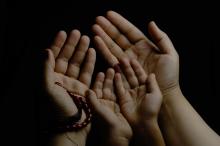
A new survey released from Pew Research Center, conducted in the lead-up to the pontiff’s visit, examined U.S. Catholics’ attitudes on family, marriage, and sexuality, as well as on issues close to the pope’s heart — concern for the poor, care for the environment, and forgiveness of sins. The results found Catholics “remarkably accepting of a wide variety of non-traditional families.”
This is not to say longstanding church teaching on marriage has changed — the church very much still upholds lifelong heterosexual monogamous marriage with children as the divine plan for coupleship, and nine-in-ten U.S. Catholics say this is the ideal arrangement. But large majorities now say other familial arrangements are acceptable, too.
According to the survey of U.S. Catholics, 85 percent say it is acceptable for a man and woman to live together as a couple outside of marriage, and 84 percent say it is acceptable for raise children in this arrangement. Two-thirds say it is acceptable for same-sex couples to raise children. And 70 percent say married couples who choose to not have children are choosing a lifestyle that is just as good as any other.

“The California drought is so bad, people in Napa are asking the pope to change the wine into water.”
That joke, courtesy of late-night TV host Conan O’Brien, is the warmup to a new “Joke with the Pope” digital campaign, encouraging people to “donate” a joke to support one of three causes ahead of Pope Francis’ historic U.S. visit.
The campaign, which begins Sept. 8, is being launched by the Pontifical Mission Societies in the United States and precedes the release of its new mobile app, Missio. The mission societies work to spread the Catholic faith overseas, especially in poor and remote areas.
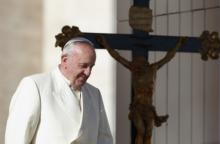
Pope Francis on Sept. 1 told priests to forgive repentant women who had had an abortion, specifically during the yearlong jubilee celebration of Catholic faith, which begins in December.
In a letter to the president of the Pontifical Council for the Promotion of the New Evangelization, the pontiff urges priests to express “words of genuine welcome” to repentant women who have undergone abortions, “combined with a reflection that explains the gravity of the sin committed.”
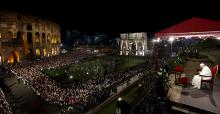
Despite Luther being thrown out of the Catholic Church during his lifetime, the Vatican reacted positively to news of the square’s upcoming inauguration.
“It’s a decision taken by Rome city hall which is favorable to Catholics in that it’s in line with the path of dialogue started with the ecumenical council,” said the Rev. Ciro Benedettini, deputy director of the Vatican press office, referring to a gathering of churchmen to rule on faith matters.
1. Where Pope Francis Learned Humility
Francis’ road to humility was like the rest of ours: long, hard, and prideful.
2. The Meaning of Serena Williams: On Tennis and Black Excellence
“For black people, there is an unspoken script that demands the humble absorption of racist assaults, no matter the scale, because whites need to believe that it’s no big deal. But Serena refuses to keep to that script.”
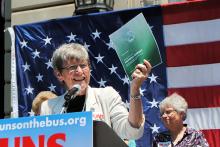
Over the course of two weeks, starting on Sept. 10 in St. Louis, Campbell and nearly a dozen nuns will travel some 2,000 miles through seven states — Missouri, Kansas, Arkansas, Tennessee, Indiana, Ohio, West Virginia — that are marked by sharp political divides.
“The route is not to our base,” she said, contrasting this trip with previous ones that often stopped in cities and towns with communities receptive to the Catholic social justice message.
“We’re going to places where there are differences of opinion, to nourish conversations about the serious work of governance.”
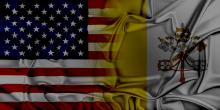
As the United States continues to navigate sensitive diplomatic channels with Cuba, Palestine, Russia, and Iran, an unlikely actor has emerged: Pope Francis.
In just a couple years, Pope Francis has managed to skillfully inject his unique brand of diplomacy onto the world stage. Yet with all diplomatic actions, only time will tell if Pope Francis’ efforts at achieving a more peaceful world will be short lived or long-lasting. Unfortunately, some within the United States aren’t content with allowing long-term diplomatic strategies develop, and have actively sought to undermine efforts to peacefully resolve differences among nations.
The nuclear deal with Iran is one such instance. After the nuclear deal between the United States, the United Kingdom, Russia, France, China, Germany, the European Union and Iran was made public on July 14th, Vatican spokesman Fr. Federico Lombardi SJ said in a statement, "The agreement on the Iranian nuclear program is viewed in a positive light by the Holy See."
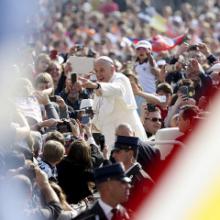
Overall, 67 percent of Americans and 90 percent of U.S. Catholics hold a favorable view of the pope.
“Americans embrace Pope Francis as a celebrity — even when they don’t know what he thinks or does,” said Robert Jones, president and CEO of PRRI.
Many attached glowing traits to Francis. Asked to describe him in their own words, most just identified him by his role as pope or other neutral terms, but 27 percent chose positive terms, calling him “humble,” “compassionate” and “caring.”
The majority share his top priorities — on concern for the poor, the environment, and the economy. But the flock veers from the shepherd on doctrine, particularly on sexuality and marriage.
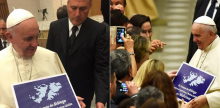
Francis’ inadvertent gesture of support for renewed talks between the two countries inevitably caused a stir in his home city, Buenos Aires, with Argentine President Cristina Kirchner posting the pope photograph on Twitter. So too did Argentina’s foreign ministry, writing: “Pope Francis receives the Argentina-UK pro-dialogue message.”
But the Vatican played down the significance of the moment, saying the pope had no idea what was written on the sign. “The Holy Father did not even realize he had taken this object in his hands. He has discovered this just now after seeing the photograph,” the Vatican said in a statement.
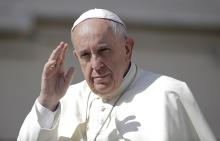
Pope Francis on Aug. 19 reflected on the "serious social damage" caused by unemployment and praised governments for their efforts to create jobs.
Speaking during his weekly audience in St. Peter’s Square, Francis said one’s working life and spiritual life are closely linked.
"The lack of work also damages the spirit, like a lack of prayer also damages practical activity," he said.
The pontiff focused on the dignity of work and the responsibility of employers.
"The management of employment is a great human and social responsibility, that cannot be left in the hands of the few," he said.

Look, we all know it — Pope Francis is a pretty unflappable guy. Anyone who earned a diploma in chemical technology, worked as a nightclub bouncer, and then emerged blinking into the sunlight as the world’s foremost religious leader only to politely ask the world to “pray for me” has got to be cool. (Seriously cool. In January he held an outdoor mass during a typhoon.)
But one thing Pope Francis won’t suffer is treating God’s commandments lightly. He is deeply serious about religion — its immense power to heal, shelter, and reconcile; and its limitless power, if abused, to degrade, divide, and injure.
So we’re willing to bet he’s got mixed feelings about coming to the U.S. in September. His visit will take him from a school in Harlem and interfaith services near the site of the September 11 attacks, to visiting Catholic Charities in Washington, D.C., and a prison in Philadelphia — a trip with, as TIME writes, a “liturgy” of a schedule.
Naturally, we in the U.S. have gone all out to show just how excited we are for his visit. But that’s where things are getting a little screwy.
Here are eight things happening right now in the lead up to the papal visit that we’re betting would make #FrancisFacepalm.

SINCE HIS ELECTION IN 2013, Pope Francis has been widely praised. But in this interview, conducted by Italian journalists Andrea Tornielli and Giacomo Galeazzi before the release of the encyclical “Laudato Si’,” Pope Francis speaks about the environment and economic justice; his perspectives on these topics have elicited harsh criticism from some.
How important is it for Christians to recover a sense of care for creation and sustainable development? And how do we ensure that this is not confused with a certain environmentalist ideology that considers humanity the real threat for the well-being of our planet?
Pope Francis: For the protection of creation we must overcome the culture of waste. Creation is the gift that God has given to humanity so it can be protected, cultivated, used for our livelihood, and handed over to future generations. The vocation to take care of someone or something is human, before being Christian, and affects all; we are called to care for creation, its beauty, and to respect all creatures of God and the environment in which we live. If we fail in this responsibility, if we do not take care of our brothers and sisters and of all creation, destruction will advance. Unfortunately, we must remember that every period of history has its own “Herods” who destroy, plot schemes of death, disfigure the face of man and woman, destroying creation.
But when humanity, instead of being custodian, considers itself to be the master, it ... moves toward destruction.
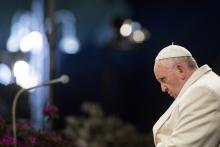
Someone has said that Pope Francis is really a Protestant. He is, if Protestant is defined as someone who protests. His recent encyclical Laudato si' is a protest against the often irresponsible industries as they pollute the environment.
Pope Francis especially protests the ways in which coal is burned in the production of electricity. He is right to protest. What comes out of the smoke stacks of coal-fed electric power plants is linked to 50,000 deaths a year, according to Physicians for Social Responsibility. Because children and the elderly among the poor are the most vulnerable, the pope, following his namesake, St. Francis, has a special concern for those that Jesus calls "the least of these."
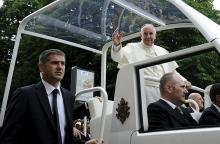
The Vatican on Aug. 10 announced a World Day of Prayer for the Care of Creation, the latest move by Pope Francis to push environmental issues up the global agenda.
The World Day will be celebrated annually on Sept. 1, in line with the Orthodox Church’s day for the protection of the environment, the pope said in the newly-released letter.
“As Christians we wish to offer our contribution towards overcoming the ecological crisis which humanity is living through,” Francis wrote in the letter, addressed to Cardinal Peter Turkson, president of the Pontifical Council for Justice and Peace, and Cardinal Kurt Koch, president of the Pontifical Council for the Promotion of Christian Unity.

Seventy years after the U.S. dropped an atomic bomb on the Japanese city of Nagasaki, Pope Francis on Aug. 9 described the bomb as a “lasting warning to humanity.”
Speaking to the faithful gathered in St. Peter’s Square, Francis recalled the “horror and repulsion” aroused by the twin bombings of Nagasaki on Aug. 9 1945, and Hiroshima, three days earlier.
“This (event) has become the symbol of mankind’s enormous destructive power when it makes a distorted use of scientific and technical progress,” he said.
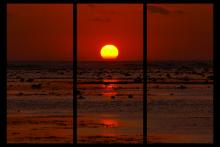
THE POPE'S “climate change encyclical,” Laudato Si’ (“Praise Be to You”), is actually far more than that: It is the most remarkable religious document in a generation, offering a powerful and comprehensive worldview that is consonant with the Bible and hence profoundly countercultural. You owe it to yourself to take a few hours and read it slowly and carefully; you’ll be enlightened, but mostly, if you’re like me, you’ll be reassured. Reassured that someone powerful in this world actually sees our time for what it is, and understands the crises facing our planet for what they are.
Near the beginning, for instance, the pope discusses the “rapidification” of life, the sense that “the speed with which human activity has developed contrasts with the naturally slow pace of biological evolution. Moreover, the goals of this rapid and constant change are not necessarily geared to the common good or to integral and sustainable human development. Change is something desirable, yet it becomes a source of anxiety when it causes harm to the world and to the quality of life of much of humanity.”
That’s as useful a description of the last 100 years as we’re likely to get, that sense of life out of balance. It affects the poor, yes, and the pope is always most mindful of the poor—but it also affects everyone. The ever-more-technologized world we inhabit no longer makes us happier. It makes us stressed.
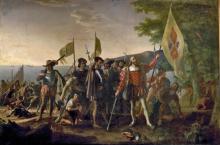
POPE FRANCIS arrives in the U.S. this September to great acclaim. The popular pontiff will speak truth to power in Congress and at the United Nations and preach the necessity of stewarding creation, promoting an economy for life, and defending human dignity.
He also will canonize Junípero Serra, the Spanish Franciscan missionary who founded the first nine of 21 Spanish missions in California in the 18th century—many say on the backs of Indigenous people. While some call Serra a “shepherd and protector,” others argue he symbolizes the colonial conquest of North America through genocide.
Serra was a human being—sometimes noble, sometimes not. However, his conquest operated under a body of Christian law and policy called the Doctrine of Discovery, a series of papal documents (“bulls”) that granted legal right of ownership to whichever European Christian nation arrived first in the new territory. Since 1823 it has also been enshrined in U.S. law. As recently as 2005, Supreme Court Justice Ruth Bader Ginsburg cited it as the basis for denying a land claim by the Oneida people, one of the five founding nations of the Iroquois Confederacy.
The Doctrine of Discovery is based on a principle of Roman law called terra nullius (“nobody’s land”) and grew out of the church’s conviction that “discovered” lands were devoid of human beings if the original people who lived there (defined as “heathens, pagans, and infidels”) were not ruled by a Christian ruler. “The Doctrine mandated Christian European countries to attack, enslave, and kill the Indigenous Peoples they encountered and to acquire all of their assets,” wrote the World Council of Churches in a 2012 statement.
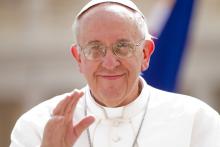
Speaking out on one of the most contentious issues of his papacy, Pope Francis on Aug. 5 issued a powerful call for the church to embrace Catholics who have divorced and remarried, telling a gathering at the Vatican that such couples “are not excommunicated, and they absolutely must not be treated that way!”
“The church is called to be always the open house of the Father … no closed doors! No closed doors!” Francis told the crowd at his weekly public audience, which resumed after a month-long summer break.
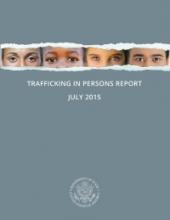
Today the U.S. State Department released the 2015 Trafficking in Persons Report (TIP), which evaluates the efforts of 188 countries to combat human trafficking. This year’s report emphasizes the risk of human trafficking in supply chains and the prevention of forced labor and sexual exploitation in the global marketplace.